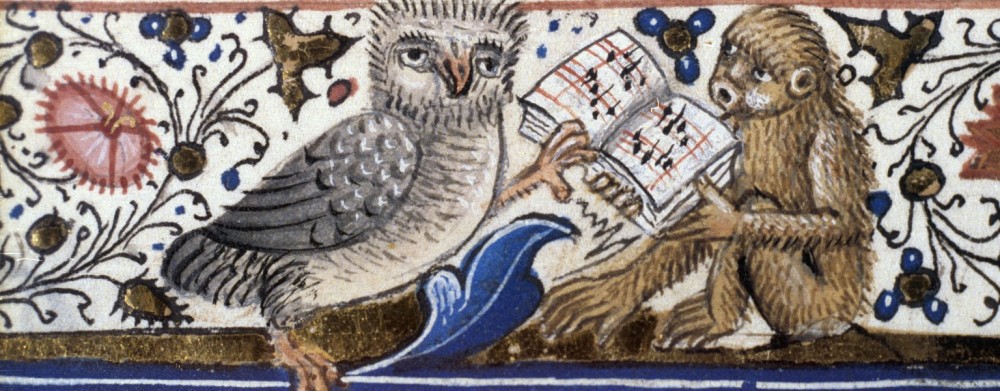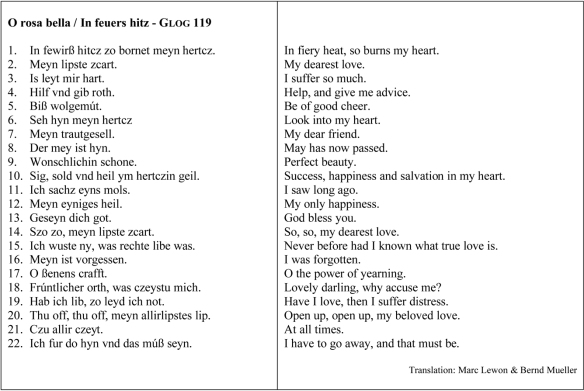With our latest CD (Das Glogauer Liederbuch / The Glogau Song Book) published only a few days ago, I would like to draw attention to the famous quodlibet compositions found in the source and on our recording.
After I had spent some time with my nose in David Fallows’ Catalogue of Polyphonic Songs, in order to track down song incipits which make up the tenor lines of these potpourri-compositions, I felt that there was a bit more to them than first meets the eye. While Glog 117 (O rosa bella / Hastu mir die laute bracht) seems to me to have been compiled mainly for comic effect, and includes the names of instruments (lute and vielle) in the incipits, the other two quodlibets closely associated with this one (by means of the shared O rosa bella cantus line) are different cases altogether.
Glog 119 (O rosa bella / In feuers hitz) features no lines approaching the comic effects evoked by Glog 117. These incipits are all quite classic for love songs of the era:
Yet, when not read as fragments but as a complete text, the incipits start to re-assemble themselves to form new sentences, creating coherent if slightly repetitive love prose:
“In fire’s heat, so burns my heart, my dearest love. I suffer so much: help, and stand by me. Be of good cheer, and look into my heart, my dear friend. May has now passed, and I once saw perfect beauty, success, happiness and salvation in my heart: [this was] my only happiness. God bless you so, so, my dearest love. Never before had I known what true love is, [because] I was forgotten—O, the power of yearning! Lovely darling, why accuse me? Have I love, then I suffer distress. Open up, open up, my beloved love, I have to go away soon, and that cannot be changed.”
(Translation: Marc Lewon & Bernd Mueller)
The last one of the three, Glog 118 (“O rosa bella / Wer da sorget”), seems to follow yet another concept: while 7 out of 14 incipits for Glog 117 could be identified in parallel sources and 18 out of 22 could be found for Glog 119 (even if some only by text concordance), no incipit for Glog 118 could so far be safely pinned down:
The only “incipit” tentatively associated with a known song by Fallows—Ich far, ich far dohyn—does not really satisfy, because the melodies do not match. Fallows’ identification of Trahe me post te as the refrain of In dulci jubilo, however, led me on a different track: what if all these supposed incipits are actually “excipits” or, better even, “refrains”? With this in mind I was able to identify another two lines of this quodlibet as refrains, which fit both words and music: Noch frew ich mich der wederfart is the refrain of the famous and oft-quoted In feuers hitz, and the already mentioned Ich far ich far dohyn turns out not to be the incipit of the well-known song Ich far dohin wann es musz sein, but the refrain of the same song. It features a repetition of the words “Ich far”, as does its quotation in the quodlibet, and also fits the melody. Furthermore, most of the fragments sound more as if they were taken out of context, rather than from the first lines of songs. Maybe more concordances will be found once people start watching out for the ends of songs or—more specifically—for refrains.
Thus the three quodlibets would not only be three different “solutions” or fun-exercises upon one cantus line, but also display three different ideas or concepts for making a quodlibet: 1st for fun, 2nd forming a new subtext, 3rd using refrains rather than incipits.
Marc Lewon
 This work is licensed under a Creative Commons Attribution-NonCommercial-ShareAlike 4.0 International License.
This work is licensed under a Creative Commons Attribution-NonCommercial-ShareAlike 4.0 International License.





Only just seen this blog. But I’m sure you’re right about the third quodlibet. I just wish we had a bit more of the repertory so that we could prove you right.
Hmmm, your ideas are intriguing to me and I just subscribed to your blog.
‘Trahe me post te’ (‘draw me towards you’) is the third line from the Song of songs, and used (addressed to Jesus) as the closing line in a stanza from a popuiar Christmas song (https://en.wikipedia.org/wiki/In_dulci_jubilo). Guerrero, Palestrina and Victoria used it (addressed to the Virgin Mary) as a first line – but that was a century later.
Thank you, Rainier. Yes, “Trahe me post te” is in fact “only” the last stanza, the ripresa, of the second strophe. But whether these snippets from songs are all merely final lines or in fact “real” refrains is only secondary to my argument. The main point is, that all of them most likely are not incipits but “excipits”. Thanks for your kind feedback.
Best, Marc Lewon
Pingback: Wolf 4 – “Ich fare do hyn wen eß muß syn” | mlewon